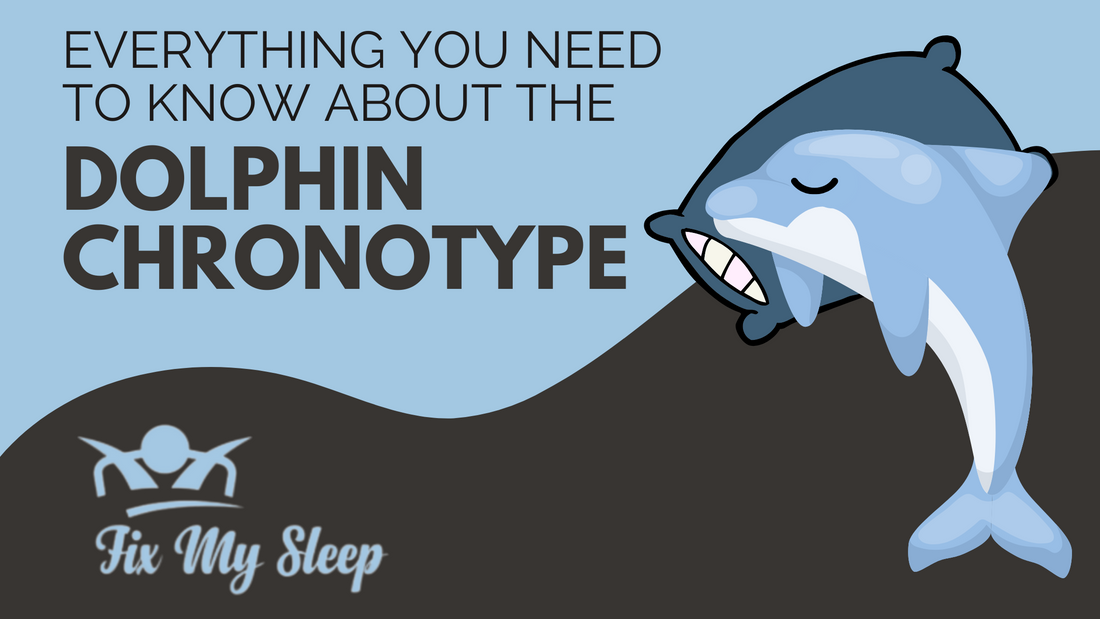From an ideal sleep schedule to a diet that will boost energy levels throughout the day, learn all about the Dolphin Chronotype.
What Is a Chronotype?
Chronotypes represent a person’s ideal sleep schedule according to their unique internal clock.
A chronotype is the body’s natural inclination to be awake or asleep at certain times. While chronotype may sound similar to circadian rhythm, it’s actually quite different.
A circadian rhythm controls our body’s sleep-wake cycle and melatonin production. This is largely affected by light exposure—meaning our circadian rhythms are set to the setting and rising of the sun.
Chronotypes, on the other hand, are believed to be based on genetics. Age may also have an influence, meaning your chronotype may change during certain periods of your life.
Because chronotypes are thought to be unaffected by any outside influence, knowing what your unique chronotype is can help you be as rested and productive as possible. If you don’t feel like you’re getting enough quality or quantity of sleep, you may not be sleeping according to your ideal chronotype schedule.
Understanding how your internal clock works can help you schedule and approach your daily activities and to-do lists more efficiently, allowing you to reserve more energy and feel more awake throughout the day.
Each of the 4 chronotype is broken down by what an ideal schedule is for maximum energy, productivity, and quality of life. While this schedule does indeed include optimum windows for sleep, it also includes ideal times for work, exercise, and even what type of foods will suit a chronotype best.
Regardless of your chronotype our Deep Sleep supplement will help you get better sleep consistently.
Changing Chronotypes
A person's chronotype can change over time so its good to take a new assessment every so often.
What Is the Dolphin Chronotype?
According to “The Sleep Doctor” Michael Breus, about 10% of people are considered to fall into the dolphin chronotype.
Dolphin chronotypes have a tendency towards insomnia and difficulty falling and staying asleep. This chronotype is aptly named as such because dolphins only sleep with half of their brain at a time.
People who fall into this category will find themselves generally restless at night and often wake up feeling groggy in the morning. One of the main culprits of the dolphin’s restlessness comes from rumination, making it challenging to fall asleep. Dolphins also tend to wake frequently throughout the night.
Despite difficulty waking up, the dolphin chronotype has the most energy around mid-morning—the perfect time to get their important tasks for the day done.
Their anxious sleeping behaviors may not be ideal, and getting a full night of sleep is a challenge. The dolphin’s ideal window for sleep will land between 12AM and 6AM.
Dolphins may have a hard time waking up in the morning, but once they get going, their productivity reaches its peak around mid-morning, around 10AM to 2PM.
The dolphin chronotype is thought to be intelligent and detail-oriented, although they can lean slightly neurotic. Dolphins are more introverted than other chronotypes and may avoid social situations.
The Best Schedule for The Dolphin Chronotype
Chronotypes don’t just influence sleep schedule—they also have an influence on exercise, appetite, core body temperature, and other variables. Because of this, certain chronotypes will feel more awake during certain periods of the day, and sluggish during others.
Ideal Schedule for The Dolphin
6:30–7:30AM: Wake up
8–10AM: Do light tasks
10AM-12PM: Focus on deep work
12–4PM: Work on slower tasks
4–10PM: Relax
10–11:30PM: Unwind + turn off devices - People love our bed-time journal for helping them unwind and calm their racing mind before bed.
12–6:30AM: Sleep
Morning
Since mornings may be especially groggy for a dolphin, they should start the day with a brisk run or some exercise. Afterward, a cold shower will help a dolphin wake up. Their movement routine should be followed by a healthy breakfast of protein and slow-release carbs to provide a boost of energy to get the day going.
Early Afternoon
Because dolphins are most productive between 10AM and 12PM, this is the perfect time for them to complete their most demanding tasks. Caffeine may be consumed, but should be done so in small amounts to avoid a crash later.
Afternoon
Since dolphins will feel a slump after lunch, a brisk walk outside will help put a pep in their step for the remaining afternoon. Naps should be avoided, as this can make falling asleep later even more challenging than usual. Dolphins may want a light snack with protein at this time to help fuel the remainder of their workday.
Evening
Dolphins should aim to have dinner around 9 PM. Dolphins will do best establishing a nighttime winddown routine—perhaps a warm bath or a good book to curl up to.
When it comes time to fall asleep, because dolphins are sensitive to noise and light, they should take care to create a bedroom that is cool, dark, and quiet. This will help quell some of the dolphin’s inability to fall asleep.
Dolphins should also avoid screens at least an hour before bed, as smartphones and laptop screens can inhibit melatonin production, causing further sleep disruptions. Dolphins should aim to be in bed with the lights out by 12AM.
This is all done to help the dolphin relax before bed and if you find that these things are still not working, you may want to consider trying our all natural sleep aid Deep Sleep.
Best Diet for Dolphin Chronotype
Because dolphins have a tendency for high blood pressure and cortisol, they should aim to eat protein-rich and slow-burning carbs for a natural boost of energy—while avoiding processed foods or added sugars.
The perfect breakfast for the dolphin is a 50/50 split between proteins and slow-release carbs, such as a quinoa bowl with eggs and avocado.
Dolphins can drink coffee but should be careful to sip the joe slowly. Too much caffeine can jar the dolphin, putting them on edge (which is the last thing the dolphin needs). Because of caffeine’s half-life, dolphins should also beware not to drink anything with caffeine too late: a 3pm cutoff is wise. If they have caffeine later in the day, it may interfere with restful sleep.
Lunch should be eaten midday—something light but filling. Dolphins may want to consider having a cup of green tea for a little energy boost, without the crash.
Dolphins can eat dinner around 9 PM, and should eat a meal rich in carbohydrates, such as pasta, chili, or chicken. A healthy but robust carb-based dinner a few hours before bed will hasten sleep for the dolphin.
Other Tips for The Dolphin Chronotype
In order to maximize productivity, increase energy levels, and enhance quality of life, there are some other tips dolphin chronotypes may want to consider.
Workouts
Dolphins will benefit from engaging in some brisk exercise first thing in the morning around 6:30 or 7AM. This will help wake the sleepy dolphin wake up by increasing cortisol and getting the blood moving. Consider taking a walk or run outside, or doing some bodyweight exercises such as crunches and push-ups to get body and mind awake.
Productivity
Because a dolphin doesn’t hit peak productivity until 10AM, they should ease into the day with lighter tasks until they feel more awake and alert in the late morning. Deep work should be performed between 10AM and 12PM. Dolphins should avoid multitasking, as it can be distracting and counterproductive.
Bedtime
With the dolphin’s sensitivity to insomnia and sleep disturbances, they should take extra care throughout the day—and especially before bedtime—to form a night routine that will help ease them into sleep. Dolphins should consider blue light glasses in the hours before lights out to avoid stimulating blue light from screens, as they can inhibit melatonin production and interfere with sleep.
Notorious for having issues relaxing, we offer our the ultimate sleep cure just for Dolphins who need a little extra help settling down their mind at night.
Dolphins should also avoid any stimulating activities later in the evening. Instead, they should opt for a warm bath, a good book, or conversations with loved ones while they lower their cortisol and blood pressure before bed.







7 comments
Thank you I read your article I am a dolphin chronotype but I do not go to bed at 12:00 that’s way too late for me I’m exhausted by 9:30 10:30 is my bedtime then I’m up throughout the night and get up at 7:00
I have Addison’s Disease, plus thyroid (hypothyroidism) plus other health issues like insomnia. Would Max Relax help me to sleep without any side effects?